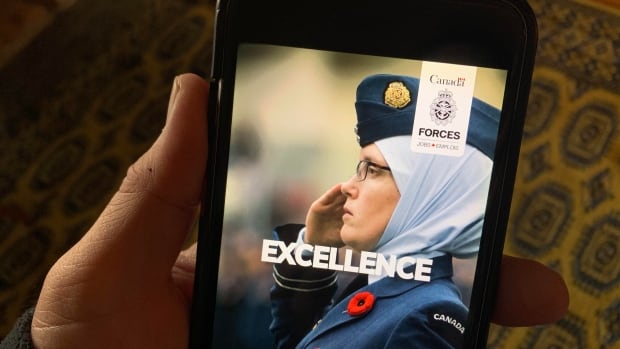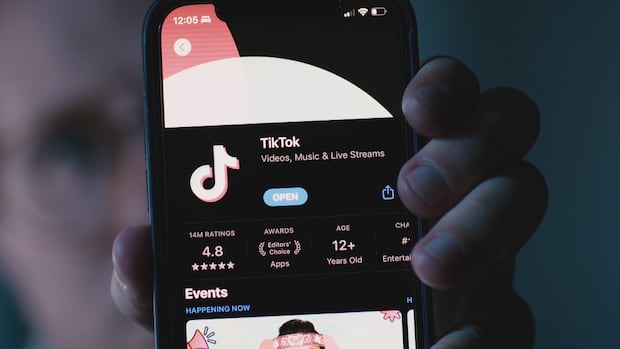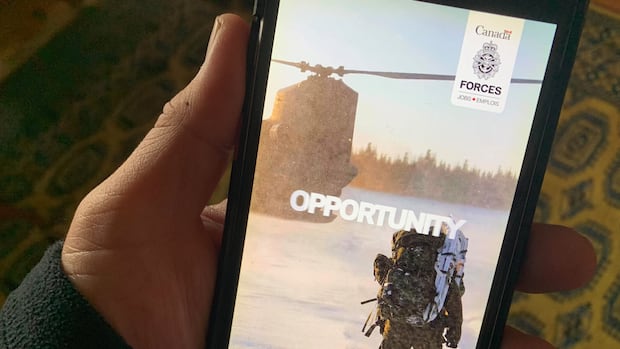
Federal government departments are still allowed to advertise on TikTok despite mounting security concerns about the social media platform, CBC News has learned.
On Wednesday, the government ordered TikTok to shut down its two Canadian offices, citing “national security risks.”
It was the latest red flag raised by government officials about the app, which is owned by a Chinese company. In May, the Canadian Security Intelligence Service (CSIS) suggested TikTok is a threat to users’ data security, and in February 2023, the Office of the Privacy Commissioner of Canada launched an investigation into TikTok’s privacy policies. That same month, Ottawa banned the social media platform from all government devices due to privacy and security concerns.
Nevertheless, the federal government hasn’t barred its departments from continuing to use the app to run taxpayer-funded ad campaigns.
Ottawa’s policy has baffled some security and technology experts who say it sends a conflicting message to Canadians trying to assess if they face risks when using TikTok.
“[Ottawa’s] suggesting that they’re going to keep using the platform, but you should be wary of using the platform,” said Brett Caraway, an associate professor of media economics at the University of Toronto.
“The messaging here is just going in opposite directions.”
Julia Wong talks to video creators to find out how the ban impacts Canadians.
David Shipely, CEO of Fredericton-based Beauceron Security, a cybersecurity firm, agrees.
“I think it’s ridiculous — pick a lane,” he said, adding that if the government has concerns about TikTok, it should avoid doing business with the platform.
“If they don’t trust these guys, they shouldn’t trust these guys.”
CSIS director David Vigneault says using TikTok is risky and the potential for the government of China to access personal data from the social media platform poses a ‘threat to the way we live.’
After repeated CBC News inquiries since May, the government revealed its TikTok advertising policy on Friday evening.
Privy Council Office spokesperson Pierre-Alain Bujold said in an email that Ottawa currently isn’t running ads on TikTok and has no “immediate” plans to do so, but confirmed the door is still open to future campaigns on the app. CBC News asked why that’s the case in light of security concerns.
Following the publication of this story, Bujold responded that government departments have used TikTok “to reach key audiences, which may be more difficult to reach via advertising on other platforms.” He said that the government will continue to evaluate where it runs ads based on the target audience.
Bujold added that running ads on TikTok poses no security concerns for government devices, because an independent ad agency posts them on the app.
Recent government ads on TikTok
During the first three months of 2024, almost one year after Ottawa had first raised concerns about TikTok, Public Safety Canada ran ads on the platform promoting emergency preparedness.
The Communications Security Establishment, Canada’s electronic spy agency, used the app during the same period to educate Canadians on how to identify online disinformation.
“TikTok is one of the social media platforms where disinformation is found, so it was relevant and necessary to advertise on that platform,” said spokesperson Ryan Foreman in an email in May.
This Department of National Defence recruitment ad appeared on TikTok between Feb. 27 and March 19.
From January to March, Health Canada also used TikTok for four campaigns on topics such as public health measures, mental health and quitting smoking.
“An important part of public health awareness campaigns is ensuring we reach the right audiences,” said spokesperson spokesperson Anne Génier said in an email in May. “TikTok continues to be an outlet that younger audiences frequent.”
In 2023, Ottawa spent $1.1 million of taxpayer money advertising on the app. That’s close to the $1.2 million the government spent advertising on Twitter (now called X) that year, but far from the $6.9 million it paid to run Facebook and Instagram ad campaigns.
Canadians can still use the app
Caraway says Ottawa’s mixed message on TikTok advertising echoes its confusing message that it’s closing the company’s Canadian offices for security reasons, but Canadians can still access the app.
Last week, Innovation Minister François-Philippe Champagne said Ottawa’s decision to shutter the offices was based on information that surfaced during a national security review, and on the advice of Canada’s security and intelligence community. He said he couldn’t reveal much of the details.
Caraway says he understands Ottawa can’t divulge everything it has uncovered and comprise its sources. However, he argues, the government still needs to offer more information to help Canadians make sense of the matter.
“It seems to me if there’s an adverse impact related to the platform, something nefarious is going on,” he said. “People trying to determine whether or not they’re going to use social media platforms would benefit from knowing what the results of the intelligence community’s analysis is.”
What are the concerns with TikTok?
Like other social media apps, TikTok collects users’ personal information and monitors their use of the service.
However, it has received additional scrutiny because the platform’s parent company, Bytedance, is based in Beijing, and Chinese laws allow the government to demand access to companies’ user information.
In May, CSIS director David Vigneault told CBC News that it’s “very clear” from the app’s design that data gleaned from its users “is available to the government of China.”
In response, TikTok said that it has never shared Canadian user data with the Chinese government, nor would it do so if asked.
In response to Canada ordering the closure of TikTok offices, a spokesperson said the company plans to take legal action.
The Office of the Privacy Commissioner says its investigation into TikTok is a top priority and expects to release its results in the coming months.




